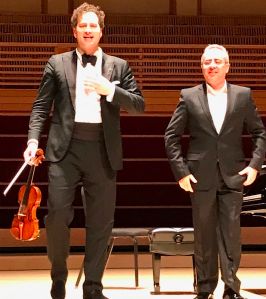|
Symphony
FROM THE NEW WORLD TO THE OLD WORLD
by Peter Lert
Saturday, June 14, 2025
Chamber
MC2 DUO RECITAL CLOSES 222'S SEASON
by Terry McNeill
Saturday, June 14, 2025
Choral and Vocal
CANTIAMO SONOMA'S LUSCIOUS A CAPELLA SINGING IN SEASON ENDING CONCERT
by Pamela Hicks Gailey
Sunday, June 8, 2025
Symphony
SRS SEASON ENDS WITH RESOUNDING TA-TA-TA-BANG
by Terry McNeill
Sunday, June 1, 2025
Symphony
YOUTHFUL VIRTUOSITY ON DISPLAY AT USO'S MAY CONCERTS
by Peter Lert
Saturday, May 17, 2025
Symphony
MYSTICAL PLANETS AND LIVELY GERSHWIN ORTIZ AT FINAL SRS CONCERT
by Peter Lert
Sunday, May 4, 2025
Symphony
VSO'S CONCERT MUSIC OF TIME, MUSIC OF PLACE
by Peter Lert
Sunday, April 27, 2025
VOCAL ELEGANCE AND FIRE AT THE 222'S RECITAL APRIL 26
by Pamela Hicks Gailey
Saturday, April 26, 2025
CANTIAMO SONOMA SINGS AN INSPIRED GOOD FRIDAY MOZART REQUIEM CONCERT
by Pamela Hicks Gailey
Friday, April 18, 2025
DRAMATIC SHOSTAKOVICH SYMPHONY CLOSES PHILHARMONIC'S 25TH SEASON
by Terry McNeill
Sunday, April 13, 2025
|
 |
 N. Znaider and R. Kulek Feb. 2 in Weill Hall (JCM Photo) |
ZNAIDER-KULEK DUO CHARMS AND CHALLANGES WEILL AUDIENCE FEB. 2
by Terry McNeill
Friday, February 2, 2018
Weill hall has mounted several exceptional piano recitals, with Garrick Ohlssonís titanic Liszt concert, and of course Lang Langís two insouciant but also compelling performances topping the list since 2013.
But arguably the virtuoso violinists have on balance been more impressive, and thoughts go back to memorable nights from Gil Shahamís six Bach works, Anne-Sophie Mutter, Christian Tetzlaff, Yu-Chien Tsong, David McCarroll, Alexei Kenny, Benjamin Bielman, Caroline Goulding, Vadim Repin, Sarah Chang and Itzhak Perlman, each reviewed at Classical Sonoma. So it was for Nikolaj Znaiderís Feb. 2 recital with the exemplary pianist Robert Kulek.
Mr. Znaider established an immediate rapport with the audience of 250, chatting about the weather, leaning down from the stage to offer a lozenge from his pocket to a coughing fan, and charmingly excusing a woman that fled with hall with a cell phone blaring.
Musical matters began with a beautifully balanced performance of Beethovenís G Major Sonata, Op. 30, No. 3. Itís easy to overplay this charming work, even with the selected brisk opening tempo, but the duo never fell into this error. As throughout the evening Mr. Znaiderís impressive control of pianissimo blended well with the pianist, with the latterís piquant sforzandos and dry arpeggios. Here Mr. Znaider did not show a rich tone, and with minimal vibrato it wasnít needed. The light touch continued through the tempo di menuetto, and in the finale allegro dynamics continued to be narrow, with the effect elegant. Clearly this duo had perfect ensemble.
Prokofievís D Major Sonata (Op. 94) followed, beginning with intonation problems, but the violinist quickly found his footing and focused on the opening moderato with a skittish clarity and a blend of the composerís unique sugary-tart harmonies. The bantamweight ending was lovely. The presto was played presto with quirky high-speed slides and off beat accents, but never went off the tracks. The long diminuendo ending the andantewas perfectly graded and deliciously drawn out.
Al of the composerís characteristics were on display in the finale Ė sarcasm, irony, humor. Mr. Kulekís stressed the dissonances and occasionally covered the violin line. They played a slow ritard before the big lyrical theme that emphasized the underlying sadness of the music. In sum, a vibrant and committed reading of a masterpiece, and for me the concertís highlight.
Franckís great A Major Sonata from 1886 should have been the capstone to the concert, and nearly was. The introductory themes were calm and happy and quite slow, with Mr. Znaider using a wider vibrato and was content to let things flow, with differences in repeated phrases. Mr. Kulekís arpeggiated chords were deftly played. The famous allegro had many felicities with pedal point at the bottom of piano runs and a big ending upward flourish. What was missing were clarity in the right-hand piano runs, some violin notes not attacked cleanly, and most telling a tad lack of intensity in this most vehement movement.
Mr. Znaider introduced the moderato with a story of his five-year old daughter, and played the music (starting in D Minor and ending in F-Sharp Minor) ravishingly, with surprisingly less vibrato and echoes of first-movement themes. Ensemble was tight. The concluding rondo had a judicious tempo that spotlighted the many modulations, and the sprint to the end generated a standing ovation. It was odd that the Franck was played with score, as were the other programmed pieces.
Beginning the second half were four of Shostakovichís Preludes from his Op. 34, transcribed by Dmitri Tsyganov. Hey were fetchingly performed, especially the 2nd (the popular Prelude, with a dry sound); the 3rd (a march with Mr. Kulekís accurate skips); and the 4th (contrasting acerbic and frothy interjections by the violin).
Two encores were offered: Brahms Second Hungarian Dance in a rollicking gypsy rhythm virtuoso romp that brought down the house, and a sultry slow Heifetz transcription with Mr. Znaiderís best schmaltzy double stops.
|

